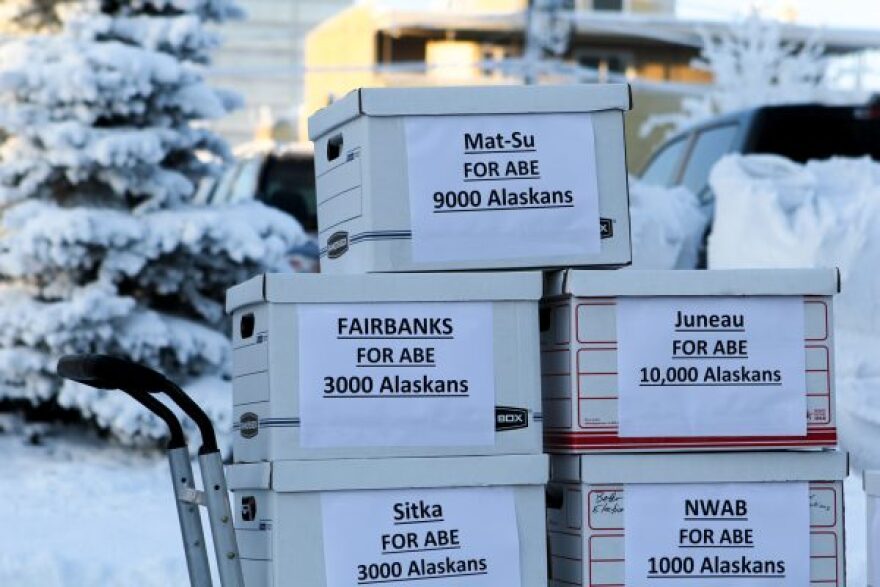Supporters of a ballot initiative that could fundamentally change how Alaska holds its elections submitted tens of thousands of signatures to officials in Anchorage Thursday.
The ballot measure, organized by the group Alaskans for Better Elections, was required to gather 28,368 signatures. Instead, the campaign says it has over 41,000 from residents spread all over the state.
It was about -5 degrees Fahrenheit as Alaskans for Better Elections' co-chair Jason Grenn and other campaign members unloaded cardboard boxes full of signature books from Anchorage, Fairbanks, the Northwest Arctic Borough, Yukon-Kuskokwim Delta, Sitka and beyond. They included all 40 Alaska House districts, Grenn said.
"We need a certain amount from the 30 of the 40, and we've done that," he said. "And then once you get to that level, we had some time, had people who were still out in the field and decided, 'Let's just keep doing it 'til we can't anymore.'"
The campaign members piled box after box onto handcarts before slowly wheeling them inside to hand over to election officials for certification.
The ballot initiative has three aims. The first would increase reporting requirements for political groups spending money to influence elections, what critics call "dark money" that has flooded American elections since the 2010 Citizens United ruling by the Supreme Court. A second measure would open up primary elections, allowing unregistered or independent voters to have a say picking party candidates ahead of general elections. The last provision would move Alaska to a ranked choice voting system, similar to the State of Maine, where voters rank candidates and their overall support is aggregated through a relatively simple process.
If it passes, Alaska would be at the cutting-edge of election reform efforts happening in states across the country.
Grenn, a former independent member of the state House, says in the months ahead the campaign will focus on education and outreach.
"Talking to stakeholders, talking with different community leaders, talking to the public, informing them what all of this does, what it doesn't do," Grenn said. "The next step is we pivot into talking to the public about why this is beneficial to the voters of Alaska."
Election officials have 60 days to certify that organizers met the threshold of support necessary to put the measure on the November ballot.
Carroll Thompson manages operations for state election work in Anchorage, and says pretty much every year her office hires temporary workers to help verify voter signatures.
"We're feast or famine," she said.
The initiative stalled when officials in the Dunleavy Administration said it was ineligible under state law because it violated the requirement that ballot items stick to a single issue. A superior court judge disagreed, and in October cleared the initiative to move forward.
According to the campaign, the top three contributors to the Alaskans for Better Elections are political organizations from Outside states: Colorado, Texas and Massachusetts.


